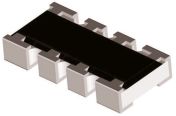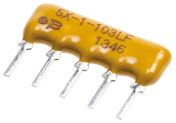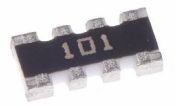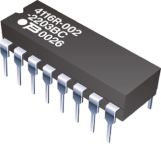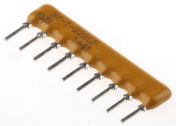Resistor Arrays
Resistor arrays (also called array resistors) are a type of fixed resistor, a device commonly used in electrical circuits to limit the flow of electricity and where the resistance is set at a specific value that can't be changed. Resistors help to prevent other circuit components from being damaged or destroyed.
How do resistor arrays work?
Resistor arrays are made from a combination of several resistors that are configured into a pattern. Although most array resistors use resistors connected in series, some resistor arrays use resistors in parallel or series-parallel designs.
Where are resistor arrays used?
Resistor arrays are convenient when you need several resistors that all have one end connected to the same point in your circuit. They're widely used in electronic applications. The most common applications include:
- Consumer electronics and computers
- Analogue-to-digital and digital-to-analogue conversion
- Voltage dividers for power supplies
Resistor Networks
A resistor network is a combination of several resistors that are configured into a pattern. They're used in electronic circuits to resist the flow of current and maintain safe currents in electrical devices. You can connect them to other components using solder.
How do resistor networks work?
Resistor networks are designed to drop the voltage of current as it flows from one terminal to another. In turn, this protects the electronic circuit against shock, heat and moisture. You can use them for analog-to-digital and digital-to-analogue conversion, as voltage dividers or in computers.
Types of resistor networks
There are several different kinds of resistor networks. These include:
- Single row pins - isolated, individual resistors, each having two pins. Or one common pin with all resistors bussed to remaining pins.
- Dual row pins - isolated, individual resistors each with two adjacent pins. Alternatively one common pin with all resistors bussed to remaining pins. Dual row pins can also feature isolated, individual resistors each with two adjacent pins.
They're all comparable by resistance, tolerance and maximum working voltage.


